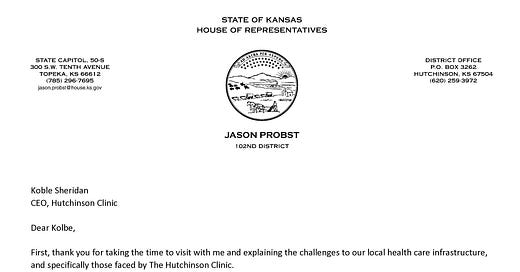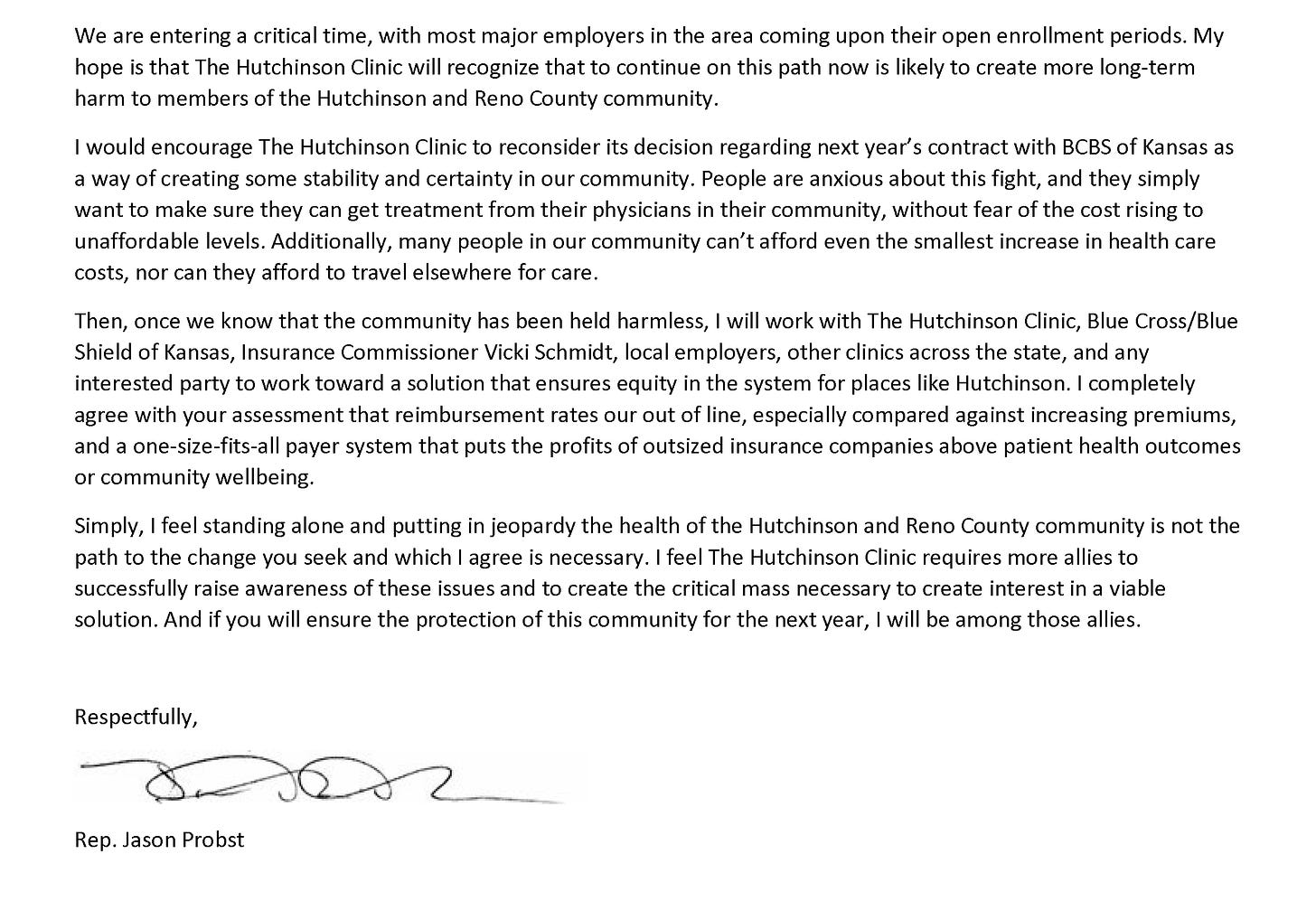I recently attended the Hutchinson/Reno County Chamber dinner, where Blue Cross/Blue Shield of Kansas was the premier sponsor and the roughly 1,000 people or so all got to take home a BCBS branded power bank - which my research indicates run between $25-$50 a piece. But not to be outdone, Hutchinson Clinic made sure it, too, had a nice presence at the annual gathering of business and community leaders.
That reminded me that I hadn’t come back with a follow up to the squabble between the biggest health insurance company in the state and the clinic where most of Hutchinson receives its medical care.
My original post on it can be found here.
The TLDR version is this: Hutchinson Clinic said that BCBS’s reimbursement rates are so low that they can’t afford to remain in network with the state’s largest insurer, and that continuing to accept such low rates would endanger the wellbeing of Hutchinson’s healthcare infrastructure. BCBS, said that they basically pay every provider in the state the same and the Hutch Clinic is asking for special treatment, which they’re not wanting to do.
I visited with Hutch Clinic’s CEO, and his take was that they were willing to take a risk on losing some patients because they couldn’t remain under the heavy hand of BCBS any longer. It was a long term strategic financial decision, he essentially said. He also pointed to a provider-owned insurance group that he indicated the clinic would move to - and that would be promoted in the community.
So I called the lobbyist for the BCBS to get his take. He said that Hutch Clinic had indicated they weren’t going to remain in-network even before BCBS had announced their reimbursement rates for the coming year. Hard to negotiate with a provider group that is so eager to get out of network - even before knowing what they’re rejecting, he said. He also indicated that there are some quality measures the Clinic could take to improve its reimbursement rate. The clinic said that because it is far more than a basic doctor’s office, the measures don’t apply across the spectrum of services they provide, or would be hard to accurately measure and report.
I then did two things.
I asked the BCBS lobbyist to get me information about what this would mean in terms of price differences for patients who wanted to stay with BCBS and retain their primary care doctor, or specialist, at the Hutchinson Clinic. I also asked that they do all they could to reach some resolution with the Clinic, and offered to facilitate any discussion.
I never heard back from him on either count.
I also sent this letter to Hutchinson Clinic’s CEO, right before the open enrollment period for most insurance enrollment periods. I thought these entities both had a duty to provide some level of certainty to patients in the community, and they could carry their fight into the next calendar year.
I never heard back from him either.
That left me feeling completely validated that all of my sour thoughts and ideas about our insurance and health care systems. (Also, if you’ve been in Hutchinson long enough to remember the Promise Regional fiasco, you’ll understand why I’m skeptical of ambitious CEOs).
So instead of getting substantial answers about what this fight would mean for this community’s health, we got a marketing battle between a health care clinic and an insurance company. Where both are spending money on mailing out letters and buying advertising to tell us how the other is wrong.
If you want to read BCBS’s side of the story, go here. If you want to read Hutchinson Clinic’s side, go here.
The one thing we can’t seem to really get a straight answer on is how much this is all going to cost you, the patient. To be fair, I haven’t called the clinic directly to ask how much more my doctor’s visits will cost. And I suspect that even if I did, both the Clinic and BCBS would go on about how incredibly complex the pricing and reimbursement models are for health care so there’s no real way to know or predict how much something could cost. (But apparently other BCBS’s around the country can absolutely determine how long a surgery should take and how much anesthesia should be required - a policy they backed away from after massive backlash).
You, dear patient, are trapped in a system that does not serve you. Health care is an industry and when something is industrialized the driving force is profit. That’s not to say that it can’t still provide some good for people - it just won’t do that good work if there’s no money in it.
And we need look no further than this dust up for proof of that. In very few cases have I heard or seen much conversation that starts and centers on patient care, access, or affordability. I have read and heard an awful lot about business models, bottom lines, and sustainability, which usually means profits.
This is one of those times where many things can be true at once.
I don’t fault providers for wanting to get paid more for their work, though I must admit I’ve yet to meet an impoverished doctor. I don’t fault the Clinic for pushing back against the largest insurer in the state and asking them to spend less money on grants, swag, and advertising showing us how much they care, and a little more on what patient’s need. And I don’t fault BCBS for not offering a special rate to one Clinic in the middle of Kansas. I wouldn’t do that either - it would open a Pandora’s Box.
So, in a sense, both sides are right. But they are also all wrong, too. Because the conversation should be about how to protect the health of our community. That should be the starting point, and then we figure out how to build upwards from there in a way that’s satisfactory. Is the purpose of these organizations to provide for and manage the health care needs of a community and a state? Or is it to make money? I’ll never believe that we can’t lead with patient care and still manage to eke out two nickels these big executives can rub together.
(For transparency’s sake, I have to admit that BCBS rejected my doctor’s request to increase the dosage of a medication that I take for a chronic condition, which had been working pretty well. The solution, then was to move to a medication with more side effects. And, I’m in the market now for health insurance, and I’m finding the process cumbersome, stupid, costly, and probably won’t cover my needs. Furthermore, I have personal relationships with my doctors here, and I don’t appreciate that an insurer can get in the middle of that. Together, it’s making me quite irritated with the entire system. But truthfully, this has only aggravated what I’ve always thought was a system focused too much on money and made needlessly complex).
So that’s how I tried to intervene in this matter, to no avail. I regret that I was unsuccessful in making any progress for the people I care about in the community. Hopefully in the coming year, cooler heads will enter this conversation and we get back to talking about the real reason health care and insurance systems exist at all.
Here’s the latest financial examination on BCBS
It’s harder to find information on Hutchinson Clinic, because they are set up as a P.A. and records aren’t publicly available.
By the way, if you don’t know history of how health insurance was created in its current form - and employer based - in the 1920s and 30s, it’s fascinating. Spoiler alert - it always was kinda sorta about money.
“When Justin Ford Kimball, a lawyer who was Baylor’s vice president, found out that the hospital was carrying a huge number of unpaid bills, he offered the local teachers’ union a deal. For $6 a year, or 50 cents a month, teachers who subscribed were entitled to a 21-day stay in the hospital, all costs included. But there was a deductible. The “insurance” took effect after a week and covered the full costs of hospitalization, $5 a day, which is about $105 in 2016 dollars.”
Here’s where things have migrated since…
In 1993, before the Blues went for-profit, insurers spent 95 cents out of every dollar of premiums on medical care, which is called their “medical loss ratio.” To increase profits, all insurers, regardless of their tax status, have been spending less on care in recent years and more on activities like marketing, lobbying, administration and the paying out of dividends. The average medical loss ratio is now closer to 80 percent. Some of the Blues were spending far less than that a decade into the new century. The medical loss ratio at the Texas Blues, where the whole concept of health insurance started, was just 64.4 percent in 2010.
In 2023, BCBS of Kansas reported its medical loss ratio between 87 and 98 percent, depending on the group. But it’s worth noting that the Affordable Care Act requires insurers to maintain a rate of 80 or above, and that I haven’t done a deep dive into where BCBS spends its money.
I probably shouldn’t be writing things like this since it’s likely I’ll be in the market for a job - you know, with health insurance. ;-) But for at least the next month, I still feel a duty to represent the regular folks of Hutchinson.






Just to be clear, are we referring to Medicare Advantage Pans or regular health insurance, and where do Medicare supplements fit in? Thanks for an informative article.
As always, you seek and distribute the truth. On top of all this, our incoming administration plans to eliminate ACA as well as making cuts to Medicare and Medicaid. Disease transmission and death rates are expected to increase. Thank you for caring enough to do this deep dive into this situation. It's always disturbing when people refuse to hear and then take solution driven actions together to prevent further long term damage.